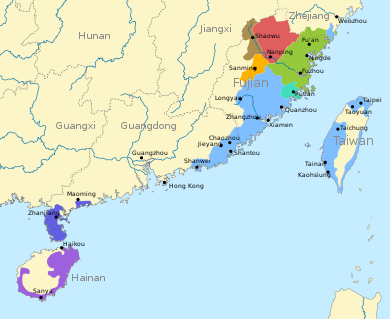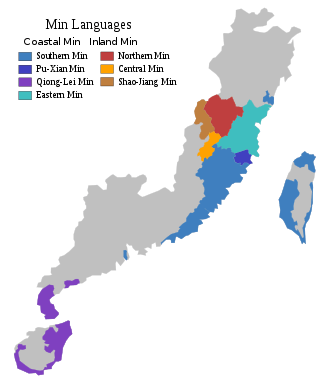Leizhou Min
Leizhou Min (simplified Chinese: 雷州话; traditional Chinese: 雷州話; pinyin: Léizhōu huà, [lěiʈʂóu xwâ]) is a branch of Min Chinese spoken in Leizhou city, Xuwen County, Mazhang District, most parts of Suixi County and also spoken inside of the linguistically diverse Xiashan District. In the classification of Yuan Jiahua, it was included in the Southern Min group, though it has low intelligibility with other Southern Min varieties. In the classification of Li Rong, used by the Language Atlas of China, it was treated as a separate Min subgroup.[3] Hou Jingyi combined it with Hainanese in a Qiong–Lei group.[4]
| Leizhou Min | |
|---|---|
| Leizhounese | |
| [lɔi˩ uɛ˨˦] | |
| Pronunciation | [lɔi˩ uɛ˨˦] (Lei city dialect) |
| Native to | China, Hong Kong and Macau, Taiwan, Singapore, Malaysia, Indonesia, United States (California) |
| Region | Leizhou Peninsula in southwestern Guangdong |
Native speakers | around 2.8 million in China (2004)[1] |
| Language codes | |
| ISO 639-3 | None (mis) |
| Glottolog | leiz1236[2] |
| Linguasphere | 79-AAA-jj |
 Leizhou Min | |
Phonology
Leizhou Min has 17 initials, 47 rimes and 8 tones.
Initials
| Bilabial | Alveolar | Velar | Glottal | |||
|---|---|---|---|---|---|---|
| Nasal | m 魔 |
n 娜 |
ŋ 俄 |
|||
| Plosive | voiced | b 磨 |
||||
| voiceless | unaspirated | p 波 |
t 刀 |
k 哥 |
||
| aspirated | pʰ 坡 |
tʰ 駝 |
kʰ 戈 |
|||
| Fricative | voiced | z 尿 |
||||
| voiceless | s 所 |
h 何 | ||||
| Affricate | voiceless | unaspirated | t͡s 槽 |
|||
| aspirated | t͡sʰ 切 |
|||||
| Lateral approximant | l 羅 |
|||||
| zero consonant | zero consonant 窩 | |||||
The phoneme given here as /b/ is described by Li and Thompson instead as /v/.[5]
Rimes
| i 濟 | u 敷 | |
| a 爸 | ia 兵 | ua 瓜 |
| ɛ 馬 | iɛ 爺 | uɛ 妹 |
| ɔ 波 | iɔ 漿 | |
| ai 派 | uai 蒯 | |
| au 包 | iau 彪 | |
| ɛu 嘔 | iu 休 | |
| ɔi 矮 | ui 拉 | |
| m̩ 唔 | ||
| am 耽 | iam 添 | |
| em 冚 | im 音 | |
| ŋ̩ 嗯 | iŋ 興 | uŋ 尊 |
| aŋ 班 | iaŋ 江 | uaŋ 完 |
| eŋ 冰 | ieŋ 填 | |
| ɔŋ 磅 | iɔŋ 永 | |
| ap 合 | iap 臘 | |
| ep 鑷 | ip 立 | |
| ik 集 | uk 郁 | |
| ak 達 | iak 燭 | uak 括 |
| ek 德 | iek 即 | uek 國 |
| ɔk 鐸 | iɔk 略 |
Tones
Leizhou has six tones, which are reduced to two in checked syllables.
| Tone number | Tone name | Tone contour | Description |
|---|---|---|---|
| 1 | yin ping (陰平) | ˨˦ (24) | rising |
| 2 | yin shang (陰上) | ˦˨ (42) | falling (high falling) |
| 3 | yin qu (陰去) | ˨˩ (21) | bottom (low falling) |
| 4 | yin ru (陰入) | ˥̚ (5) | high checked |
| 5 | yang ping (陽平) | ˨ (2) | low |
| 6 | yang shang (陽上) | ˧ (3) | mid |
| 7 | yang qu (陽去) | ˥ (5) | high |
| 8 | yang ru (陽入) | ˩̚ (1) | low checked |
See also
- Taiwanese Hokkien
- Teochew dialect
- List of Chinese dialects
References
- 湛江市志·第三十六篇 方言·第三章 雷州话
- Hammarström, Harald; Forkel, Robert; Haspelmath, Martin, eds. (2017). "Leizhou". Glottolog 3.0. Jena, Germany: Max Planck Institute for the Science of Human History.
- Kurpaska, Maria (2010). Chinese Language(s): A Look Through the Prism of "The Great Dictionary of Modern Chinese Dialects". Walter de Gruyter. pp. 54–55, 86. ISBN 978-3-11-021914-2.
- Hou, Jingyi 侯精一 (2002). Xiàndài hànyǔ fāngyán gàilùn 现代汉语方言概论 [An Introduction to Modern Chinese Dialects]. Shanghai Educational Press 上海教育出版社. p. 238.
- Li, Charles; Thompson, Sandra (1983). "A Grammatical description of Xuwen : A colloquial dialect of Lei-zhou Peninsula (Part I)". Cahiers de Linguistique Asie Orientale. 13 (1): 3–21.
- Běijīng dàxué zhōngguóyǔyánwénxuéxì yǔyánxué jiàoyánshì. (1989) Hànyǔ fāngyīn zìhuì. Běijīng: Wénzìgǎigé chūbǎnshè.(北京大學中國語言文學系語言學教研室. 1989. 漢語方音字匯. 北京: 文字改革出版社)
- Norman, Jerry. [1988] (2002). Chinese. Cambridge, England: CUP ISBN 0-521-29653-6
- Yuán, jiāhuá (1989). Hànyǔ fāngyán gàiyào (An introduction to Chinese dialects). Beijing, China: Wénzì gǎigé chūbǎnshè. (袁家驊. 1989. 漢語方言概要. 北京:文字改革出版社.)
- Zhū, yuèmíng. (2005) "Léizhōuhuà yú Pǔtōnghuà bǐjiàoyīnxì yánjiū" (Comparative phonological studies on the Leizhou dialect and Putonghua) Yúnnán shīfàndàxué xuébào (zhéxué shèhuìkēxué bǎn) (Yunnan Normal University Journal (philosophy and social sciences)): vol.37 no. 5 p. 133-136. (朱月明. 2005. "雷州話與普通話音系比較研究" 《雲南師範大學學報 (哲學社會科學版)》: 第 37 卷 第 5 期 頁133-136)
- Office of Chorography of Zhanjiang City 湛江市地方志办公室 (2004). Zhan jiang shi zhi 湛江市志 ["Chorography of Zhanjiang City"]. 36. Beijing: Zhonghua Book Company. ISBN 7-101-04214-7.
Further reading
- Li, Charles; Thompson, Sandra (1983a). "A Grammatical description of Xuwen : A colloquial dialect of Lei-zhou Peninsula (Part I)". Cahiers de Linguistique Asie Orientale. 12 (1): 3–21. doi:10.3406/clao.1983.1123.
- Li, Charles; Thompson, Sandra (1983b). "A Grammatical description of Xuwen : A colloquial dialect of Lei-zhou Peninsula (Part II)". Cahiers de Linguistique Asie Orientale. 12 (2): 119–148. doi:10.3406/clao.1983.1138.
- Yue-Hashimoto, Anne O. (1985). The Suixi Dialect of Leizhou: A Study of Its Phonological, Lexical and Syntactic Structure. Chinese University of Hong Kong. OCLC 15111722.
External links
